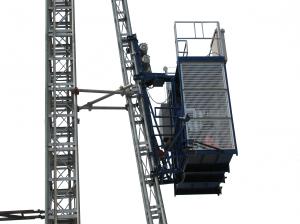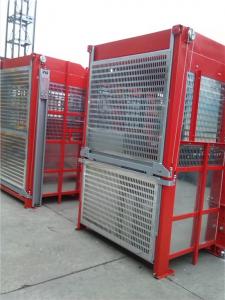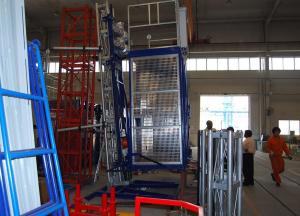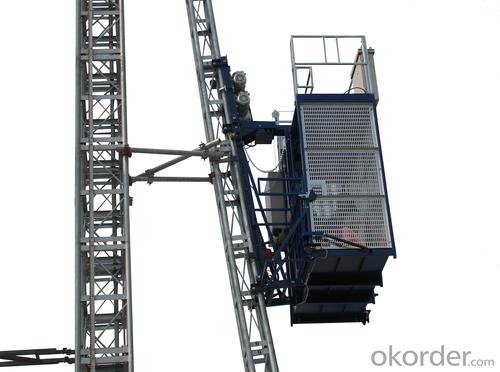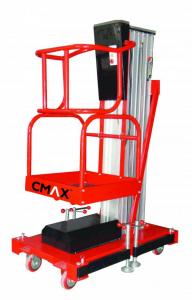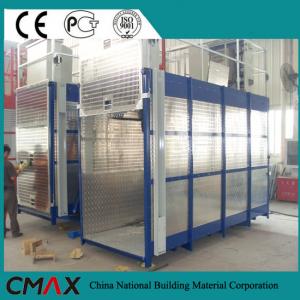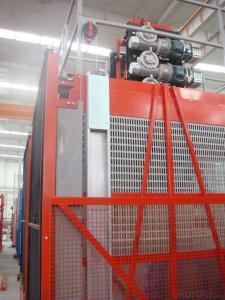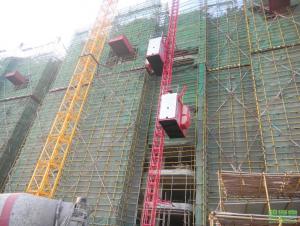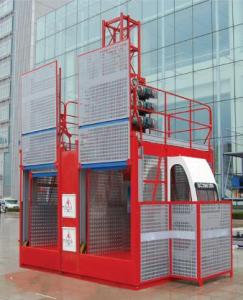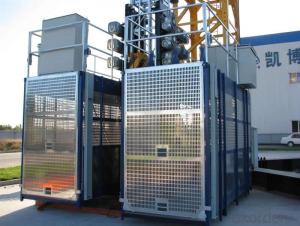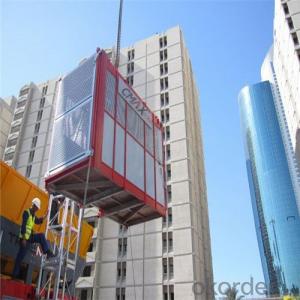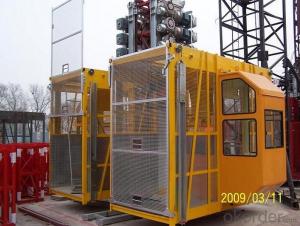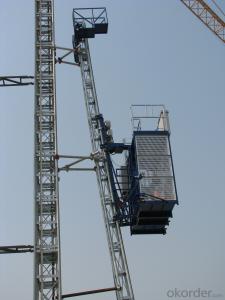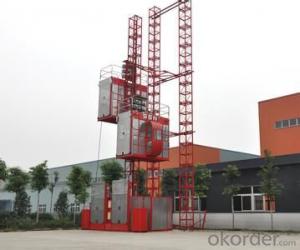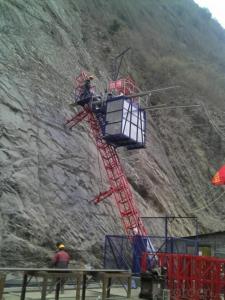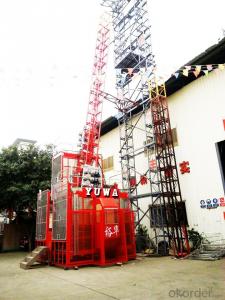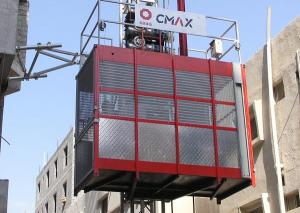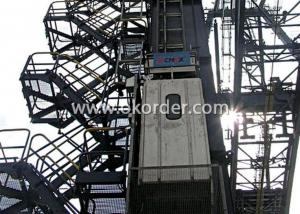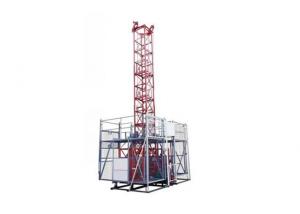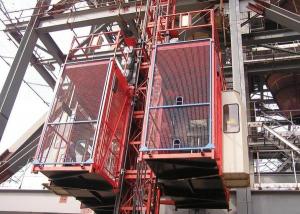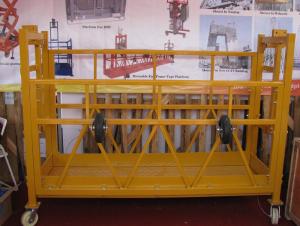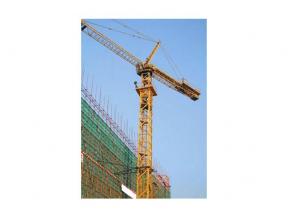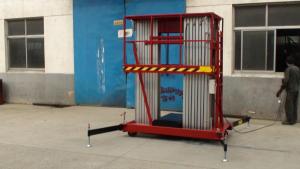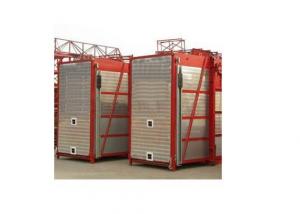Curved Hoist SCQ60
- Loading Port:
- China Main Port
- Payment Terms:
- TT or L/C
- Min Order Qty:
- 1 Set set
- Supply Capability:
- Sets Per Month set/month
OKorder Service Pledge
OKorder Financial Service
You Might Also Like
Building Hoist Description SCQ60
Condition: New
Application: Construction
Payload(kg):600
Lifting Speed(m/min):0~33
Motor Power(kw): 2*3*22
Safety Device: 2*SAJ50-1.4
Cage: Single/double cages
Counterweight: No
Certification: CE/ ISO
Place of Origin: China(Mainland)
Model Number: Type:SCQ60
Packaging & Delivery of Building Hoist
Packaging Detail: Nude package Delivery Detail: 25-30days
Main Parts of Building Hoist
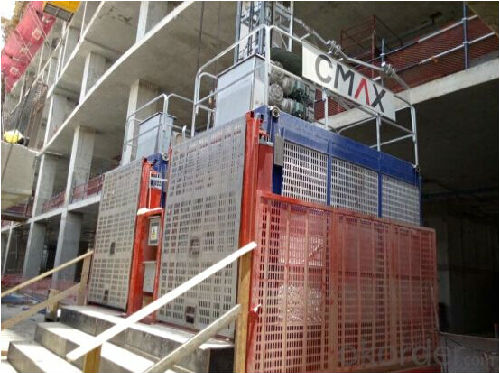
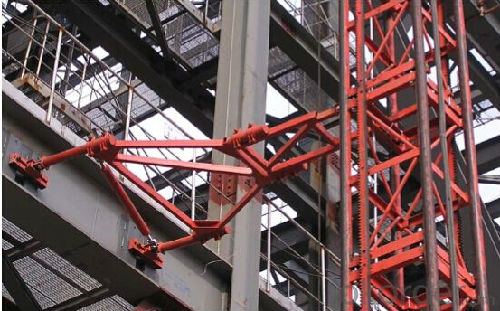
Feature:
● Stepless speed control helps eliminate the concussion during start up and braking, steady the operation process,
and ensures automated leveling.
● Adopts open loop V/Fcontrol; the speed control precision. Realizes accurate low speed positioning of the hoist and avoid slipping during downward stopping of hoist.
● The system has current-restriction function, ensuring a small current when motor start up and reducing the
● The steadiness during running mitigates concussion to mechanical parts, reduces wears of rack, pinion and the brake
and prolongs the spare parts'life.
● Thesystem also has the over voltage protection,low voltage protection, overcurrent, overload and anti-stalling protection functions,
● The system applies the special software for hoists developed by our company, making the operation more safe and
reliable.
Building Hoist Specifiction
FAQ of Building Hoist
Q: What is the building hoist main purpose?
A: Building hoist equipped with double or single cabin to transport the materials and labors up and down. It's the ideal
construction equipment for vertical transportation in the field of construction.
Q: What is the main structure of building hoist?
A: The P/M construction hoist mainly contains metal structure, driving system, electrical control system, cable guide &
protection system, electrical top crane and safety device.
Q: What is the meaning of the building hoist’s code?
A: stands for double cage and capacity is 2 tons per cage. stands for single cage and capacity is 2 tons.
Q: What is the dimension of the cage?
A: Normally the cage dimension is for 2t type hoist. Details should be checked according to our
quotation sheet. Also, the size can be customized according to the factual site condition. There are two doors for each cage, It can be produced as up & down sliding or ramping model for safety and convenience.
- Q: This question asks for an explanation of how to use an overload protection device specifically in the context of a building hoist.
- <p>An overload protection device is crucial for a building hoist to prevent accidents caused by excessive weight. First, ensure the device is correctly installed and calibrated according to the manufacturer's instructions. Before operating the hoist, set the overload limit based on the hoist's capacity. During operation, if the load exceeds the set limit, the device should automatically shut down the hoist, preventing further operation. Regularly inspect and test the device to ensure it functions properly. Always follow safety protocols and never attempt to bypass or disable the overload protection system.</p>
- Q: What are the specific safety mechanisms and controls that are typically incorporated into the design of a building hoist to ensure its safe operation?
- <p>Building hoists, also known as construction hoists, are equipped with several safety devices and controls to ensure safe operation. These include limit switches to prevent overtravel, safety locks that engage if the hoist sways excessively, emergency stop buttons for immediate cessation of movement, overload protection to prevent the hoist from lifting more than its capacity, and interlock systems that ensure the hoist cannot operate if a safety gate is open. Additionally, there are guardrails, toe boards, and anti-fall devices to protect workers from falling. Regular inspections and maintenance are also crucial for the safe operation of building hoists.</p>
- Q: Is the construction elevator a special equipment
- Belong to special equipment construction lifter, but generally used as home building municipal engineering does not belong to the quality and technical supervision management, but belong to the administration of urban construction. Because the system of quality control unless invited, shall not be involved in military, aerospace, nuclear industry, mine, municipal, sea, railway locomotive hoisting machinery management.
- Q: This question asks whether a building hoist can be utilized in construction or demolition activities.
- <p>Yes, a building hoist can be used for both construction and demolition work. In construction, hoists are essential for transporting materials and personnel vertically within a building under construction. They are designed to handle heavy loads and operate safely at significant heights. In demolition, hoists can be used to remove debris and transport workers to different levels of a structure being dismantled. However, it's crucial to ensure that the hoist is suitable for the specific task and that all safety protocols are followed to prevent accidents.</p>
- Q: Is it safe to use an electric lifting device indoors if it is not certified for indoor use?
- <p>It is not advisable to use an electric lifting device indoors if it is not certified for such use. Non-certified devices may not meet safety standards for indoor environments, including electrical safety, structural integrity, and risk of fire. Using uncertified equipment can lead to accidents, injuries, or property damage. Always ensure that any lifting equipment complies with local regulations and is suitable for the intended environment to maintain safety.</p>
- Q: This question asks about the various mechanisms that enable lifting in building hoists, which are essential for construction projects.
- <p>Building hoists utilize several types of lifting mechanisms to efficiently move materials and personnel. The most common types include: 1. Geared Hoists, which use a system of gears to lift and lower loads. 2. Electric Chain Hoists, powered by electric motors and are suitable for heavier loads. 3. Air Hoists, which use compressed air to generate lifting force and are ideal for environments where electricity is a hazard. 4. Manual Chain Hoists, operated by hand and best for lighter loads. 5. Electric Wire Rope Hoists, which offer high lifting capacities and are controlled by electric motors. 6. Pneumatic Hoists, similar to air hoists but use pneumatic power for lifting. Each type has specific applications and safety considerations, making them suitable for different construction needs.</p>
- Q: Is it possible for a hydraulic cylinder in a building hoist to be serviced or replaced by individuals other than the manufacturer?
- <p>Yes, a hydraulic cylinder in a building hoist can be repaired or replaced by qualified individuals or companies other than the manufacturer. However, it is crucial to ensure that the service provider has the necessary expertise and follows the manufacturer's specifications to maintain safety and performance standards. Using non-genuine parts or improper installation can lead to safety hazards and void warranties. It is always recommended to consult with professionals who are familiar with the specific hoist model and have experience in hydraulic systems repair and maintenance.</p>
- Q: Is it permissible to use a building hoist for lifting people or animals?
- <p>No, building hoists are not designed for lifting people or animals. They are specifically engineered for the transportation of materials and construction equipment. Using a building hoist for this purpose is dangerous and can lead to accidents. It is essential to adhere to safety regulations and use appropriate equipment for lifting people or animals to ensure their safety and comply with legal standards.</p>
- Q: What precautions should be taken on construction sites when operating a building hoist?
- <p>Safety measures for using a building hoist in construction sites include regular inspections and maintenance to ensure the hoist is in good working condition. Operators must be trained and certified to use the hoist. Safety barriers or gates should be installed to prevent unauthorized access. Load limits must be strictly adhered to, and overloading is prohibited. Emergency stop buttons should be easily accessible. Workers should wear appropriate personal protective equipment (PPE). Regular safety briefings and training sessions should be conducted to keep workers informed about safe hoist operation procedures.</p>
- Q: This question asks if a building hoist can be utilized in both commercial and residential settings.
- <p>Yes, a building hoist can be used for both commercial and residential purposes. These hoists are designed to lift materials and workers to various levels of construction sites. In commercial settings, they are often used in the construction of office buildings, shopping centers, and other large-scale projects. In residential construction, they are used for multi-story apartment buildings or private homes. It's important to note that the specific type and capacity of the hoist should be suitable for the scale and requirements of the project to ensure safety and efficiency.</p>
1. Manufacturer Overview
| Location | Jiangsu,China |
| Year Established | 1990 |
| Annual Output Value | Below US$1 Million |
| Main Markets | Mid East;Southeast Asia;South America |
| Company Certifications | ISO 9001:2008; |
2. Manufacturer Certificates
| a) Certification Name | |
| Range | |
| Reference | |
| Validity Period |
3. Manufacturer Capability
| a) Trade Capacity | |
| Nearest Port | SHANGHAI |
| Export Percentage | 1% - 10% |
| No.of Employees in Trade Department | 300 |
| Language Spoken: | English;Chinese |
| b) Factory Information | |
| Factory Size: | Above 300,000 square meters |
| No. of Production Lines | Above 15 |
| Contract Manufacturing | OEM Service Offered;Design Service Offered |
| Product Price Range | Average |
Send your message to us
Curved Hoist SCQ60
- Loading Port:
- China Main Port
- Payment Terms:
- TT or L/C
- Min Order Qty:
- 1 Set set
- Supply Capability:
- Sets Per Month set/month
OKorder Service Pledge
OKorder Financial Service
Similar products
Hot products
Hot Searches
Related keywords
